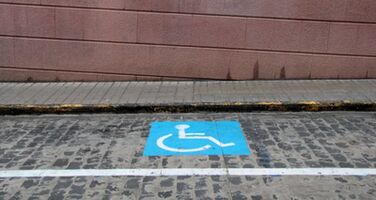
Discover the Benefits of Having a Handicap Placard in Kansas
For individuals living with disabilities, daily tasks such as parking and accessing public spaces can pose unique challenges. Whether it’s going to the grocery store, visiting a doctor’s office, or attending social events, finding convenient and accessible parking is crucial. Fortunately, the disability parking tag—commonly referred to as a disability placard or permit—makes life easier for people with mobility limitations by providing access to designated accessible parking spaces.
In KS, disability tags are issued by the Department of Revenue (DOR) and come with a range of benefits designed to improve accessibility and ensure that people with disabilities can maintain their independence. However, the advantages of having a disability tag extend far beyond just parking. From reduced physical strain to compliance with the Americans with Disabilities Act (ADA), having a disability tag can significantly enhance the daily lives of those who qualify.
This article will explore the benefits of having a handicap placard in Kansas, how to apply for one, and what rules you need to follow. We’ll also address common questions with a FAQs section and provide a clear conclusion that summarizes the key points.
Understanding Handicap Placards in Kansas
What Is a Disability Tag?
A disability tag is a permit issued to individuals with qualifying disabilities that allows them to park in accessible parking spaces. These spaces are located close to the entrances of buildings, public facilities, and businesses, making it easier for individuals with mobility impairments to access essential services and public places.
In KS, the Department of Revenue (DOR) is responsible for issuing disability tags. The tags can either be permanent or temporary, depending on the individual’s condition, and are designed to alleviate the stress and physical strain that comes with finding and using standard parking spaces.
Types of Disability Tags Available
In KS, two types of handicap permits are available:
Permanent Disability Tag: This is issued to individuals with long-term or permanent disabilities. It is valid for up to three years and must be renewed before it expires.
Temporary Disability Tag: This is issued to individuals with temporary disabilities, such as those recovering from surgery or injury. It is valid for up to six months and can be renewed if necessary, with updated medical certification.
Both types of tags provide the same parking privileges, allowing individuals to park in designated accessible spaces, but they are issued based on the duration and nature of the disability. To qualify for a disability tag, an applicant must have a documented condition that limits mobility or requires the use of assistive devices, as certified by a licensed medical professional. Once obtained, a disability tag can open up many benefits for the holder, including easier access to accessible handicap parking spaces and facilities across the state.
Eligibility Criteria for a Handicap Placard in Kansas
Qualifying Medical Conditions
To be eligible for a disability tag in KS, an individual must have a medical condition that significantly limits their mobility. The state follows guidelines similar to the Americans with Disabilities Act (ADA), which includes a wide range of conditions. Some common qualifying conditions include:
- Inability to walk 100 feet without stopping to rest.
- Use of portable oxygen.
- Severe lung disease or respiratory conditions.
- Heart conditions classified as Class III or IV by the New York Heart Association.
- Severe arthritis, neurological, or musculoskeletal conditions that impair mobility.
- Amputation or permanent loss of function of limbs.
- Legally blind or significant visual impairments.
Temporary vs. Permanent Disabilities
KS distinguishes between temporary and permanent disabilities when issuing disability tags. For example:
Temporary tags are for conditions like broken bones, post-surgery recovery, or short-term illnesses that temporarily limit mobility. These tags expire after six months but can be renewed if needed.
Permanent tags are issued to individuals with conditions that are unlikely to improve, such as chronic illnesses or physical impairments that persist indefinitely.
Both temporary and permanent disability tags require medical certification from a licensed healthcare provider to verify the applicant’s condition.
The Application Process for a Disabled Permit in Kansas
Step-by-Step Guide to Applying for a Disability Tag
The process of applying for a Kansas handicap placard is straightforward, but it requires proper documentation to ensure that the applicant meets the eligibility requirements. Here’s a step-by-step guide:
Obtain the Application Form: The Handicap Placard/License Plate Application (Form TR-159) is available on the Kansas Department of Revenue website or at any local County Treasurer’s Office.
Fill Out the Form: Complete the applicant’s portion of the form, providing your personal information, such as your name, address, and driver’s license number.
Medical Certification: A licensed HandicapMD healthcare provider must complete the medical certification section of the form. This certifies that the applicant has a qualifying disability.
Submit the Application: Mail the completed form or submit it in person at your local County Treasurer’s Office. If you are applying for a permanent disability license plate (rather than a tag), you may need to provide proof of vehicle ownership.
Receive Your Tag: Once the application is approved, the disability tag will be mailed to you. If applying in person, you may receive the tag immediately.
Required Documentation
To apply for a disability tag in KS, you will need the following:
- A completed Handicap Placard/License Plate Application (Form TR-159).
- Medical certification from a licensed healthcare provider.
- Proof of identity, such as a valid Kansas driver’s license or state ID.
There are no fees for applying for a permanent disability tag, but there may be a small fee for temporary tags or disability license plates.
How to Obtain a Permit Online with HandicapMD.com
HandicapMD.com offers a convenient telehealth service that simplifies the process of getting your disabled parking permit by allowing you to:
- Sign Up: Visit the HandicapMD.com website and fill out the necessary form to schedule a consultation.
- Consultation: A certified doctor will assess your medical records and determine whether you meet the eligibility criteria.
- Medical Certification: The doctor will complete the certification section of the Handicap Placard/License Plate Application (Form TR-159).
- Submit Your Application: Once your form is completed, submit it to the state's DMV either in person or by mail.
Top Benefits of Having a Handicap Placard in Kansas
There are several key benefits to having a handicap placard in KS that can improve accessibility and enhance the quality of life for those who qualify.
1. Access to Designated Parking Spaces
The primary benefit of having a disability tag is gaining access to designated accessible parking spaces. These spaces are usually located near building entrances and provide extra room for vehicles equipped with ramps or lifts. This proximity reduces the distance individuals with disabilities need to walk, making it easier to access essential services and amenities.
2. Reduced Physical Strain
Navigating long distances from parking spaces to entrances can be challenging, especially for those with physical limitations. A disability tag minimizes the physical strain and fatigue associated with walking extended distances, which is particularly helpful for individuals with chronic pain, respiratory issues, or other health conditions. By reducing physical exertion, the tag supports greater independence and comfort in daily routines.
3. Compliance with ADA Regulations
The Americans with Disabilities Act (ADA) mandates that businesses and public facilities provide accessible parking spaces. Disability tags ensure that you can benefit from these provisions, giving you legal access to the spaces that comply with ADA guidelines. This means that whether you're visiting a shopping center, hospital, or government building, you’ll always have a place to park that accommodates your needs.
4. Parking Privileges Across the United States
One of the lesser-known benefits of having a disability tag in KS is that it is valid in all U.S. states. Thanks to the ADA, disability tags are recognized nationwide, allowing you to use designated accessible parking spaces while traveling. Whether you're visiting family in another state or taking a road trip, your KS-issued disability tag will ensure you have access to accessible parking.
5. Easy Renewal and Replacement
KS makes it easy to renew or replace a disability tag if it expires or gets lost or damaged. Permanent tags are valid for three years, while temporary ones last for up to six months. If your tag is lost or stolen, you can apply for a replacement through your local County Treasurer’s Office without hassle.
6. Easier Access to Facilities
Having a disability tag can help individuals access a variety of facilities, including hospitals, shopping centers, workplaces, and public venues, more easily. Facilities in KS, including entertainment venues and government buildings, typically have accessible parking spaces reserved for disability tag holders, which ensures smoother access to vital services and recreational spaces.
7. Support for Short-Term Disabilities
KS offers temporary disability tags for residents with short-term conditions, such as a broken leg or post-surgery recovery. This temporary access is invaluable, providing convenience and accommodation during a period of limited mobility. Temporary disability tags can also be renewed if the medical condition requires extended accommodation.
8. Increased Independence and Quality of Life
Having a disability tag can provide a sense of empowerment and independence. For individuals who otherwise rely heavily on caregivers, having the freedom to access closer parking allows for increased autonomy in running errands, attending appointments, or meeting friends. This enhanced independence translates to a better quality of life and allows individuals to engage in activities they enjoy.
9. Accommodations at Workplaces and Educational Institutions
In KS, disability tags may also facilitate better access to workplaces and educational institutions that provide designated accessible parking spaces. Employers and schools that comply with the Americans with Disabilities Act (ADA) typically offer accommodations for employees and students with disabilities, including convenient parking arrangements. Having a disability tag makes it easier to secure these accommodations, ensuring that work and educational spaces are accessible.
10. Priority Parking in Emergency Situations
In emergencies, having a disability tag can be a critical benefit. It ensures priority parking access to hospitals, medical facilities, and emergency shelters, making it easier for individuals with limited mobility to access assistance or seek medical care quickly. The ability to park closer to emergency services can make a significant difference in urgent situations.
Rules and Guidelines for Using a Handicap Placard
Proper Display of Your Disability Tag
In KS, your disability tag must be properly displayed in the vehicle to avoid fines or penalties. Here’s how to display it correctly:
- Hang the tag from the rearview mirror when the vehicle is parked.
- Ensure the front of the tag (showing the expiration date and permit number) is clearly visible from outside the vehicle.
- Remove the tag when driving to avoid obstructing your view.
Where You Can and Cannot Park
Having a disability tag allows you to park in designated accessible parking spaces marked with the blue and white wheelchair symbol. However, there are a few important rules to keep in mind:
- You cannot park in restricted zones, such as fire lanes, loading zones, or areas marked "No Parking," even with a disability tag.
- You must comply with any posted time limits in accessible spaces, unless otherwise indicated.
- Your disability tag does not grant you free parking in metered spaces unless local ordinances specifically allow it.
Misuse and Its Consequences
Misusing a disability tag can lead to serious consequences, including fines, penalties, and the potential loss of parking privileges. Common examples of misuse include:
- Allowing someone else to use your tag when you’re not in the vehicle.
- Using an expired or invalid tag.
- Parking in non-designated spaces (such as fire lanes or regular spaces) with a disability tag.
KS law imposes fines for disability tag misuse, and repeated violations could result in losing the right to use a disability tag altogether.
Frequently Asked Questions (FAQs)
1. Can I use my KS disability tag in other states?
Yes, KS disability tags are recognized in all U.S. states under the Americans with Disabilities Act (ADA). You can use your tag to park in designated accessible spaces while traveling. However, be sure to check local regulations regarding parking fees and time limits, as these may vary by city or state.
2. How long is a disability tag valid in KS?
- Permanent disability passes are valid for three years and must be renewed upon expiration.
- Temporary disability passes are valid for up to six months and can be renewed if necessary with updated medical certification.
3. What should I do if my disability tag is lost or stolen?
If your disability tag is lost or stolen, you can apply for a replacement at your local County Treasurer’s Office or the Kansas Department of Revenue. There is no fee for replacing a lost or stolen permanent tag.
4. Can someone else use my disability tag without me?
No, KS law prohibits the use of a disability tag when the person with the disability is not present in the vehicle. The tag is issued to the individual with the disability, and misuse of the tag can result in fines or penalties.
5. Are there penalties for misusing a disability tag?
Yes, misuse of a disability tag in KS can lead to fines, penalties, and even the revocation of parking privileges. Common forms of misuse include using the tag without the permit holder being present or parking in non-designated areas.
6. What medical conditions qualify for a disability tag in KS?
Qualifying conditions include severe arthritis, chronic respiratory conditions, cardiac issues, mobility impairments, and any disability that limits an individual's ability to walk or requires the use of mobility aids.
7. Is a new medical certification required for renewing a permanent disability tag?
No, for permanent tags, a new medical certification is not required for renewal. The tag simply needs to be revalidated with the KDOR every five years.
8. Are there fees for obtaining a disability tag in KS?
Permanent disability tags are free in KS, but temporary tags require a small fee, typically collected during application submission.
9. Can I park for free at metered spaces with a disability tag?
While some cities may offer free metered parking for disability tag holders, this is not a statewide rule. Check local parking ordinances to see if this benefit is offered.
10. Are accessible parking spaces enforced regularly in KS?
Yes, KS enforces accessible parking laws, and violators can be ticketed or fined. It’s important to respect these spaces to ensure availability for those with legitimate needs.
11. What should I do if I see someone misusing a disability tag?
If you witness suspected misuse of a disability tag, you can report it to local law enforcement. Misuse undermines the accessibility of these spaces for individuals who genuinely need them.
Conclusion
Having a handicap placard in Kansas offers numerous benefits that make daily life easier for individuals with disabilities. From convenient access to designated parking spaces to compliance with the ADA, a disability tag can significantly reduce the physical strain of everyday tasks. However, it’s important to use the tag responsibly, ensuring that it’s properly displayed and used only in designated accessible spaces.
By following the guidelines set by the state and renewing the tag as needed, individuals can enjoy the full range of benefits that come with having a disability tag in KS. Whether you’re dealing with a temporary or permanent condition, a disability tag can provide the support you need to navigate your community more easily.
.png)






